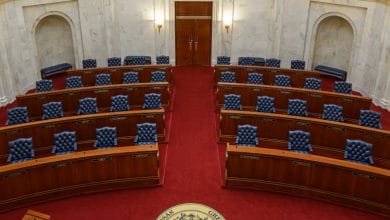Much of the attention of the Arkansas legislature in 2023 will be on protecting our children from radical left indoctrination and on providing every parent the opportunity to choose a school for their children. Yet there is another issue affecting families we must also focus on and that is the impact of high taxes in our state.
During the past several years, legislation has been passed to reduce the Arkansas Income tax. But Arkansas is still a high-income tax state. Unfortunately, during those eight years, several tax increases were also adopted, such as the gasoline and diesel tax increase and the internet sales tax — which is paid by Arkansas consumers making online purchases.
Arkansas’s already high taxes plus the additional tax increases have contributed to record surplus tax collections over the past few years.
TAX RELIEF MUST BE A PRIORITY IN 2023, ESPECIALLY AS ARKANSANS ARE FACING HIGH INFLATION.
We expect the Arkansas legislature to consider several bills to provide tax exemptions for certain items and circumstances. Many of these bills will have much merit. Conduit will likely support several exemptions, but our main focus is tax relief that applies broadly.
Below, we consider some of the areas where tax relief is crucial.
Individual Income Tax Relief
Over the last eight years, the Arkansas Income Tax on individuals has been cut several times; but despite those cuts, Arkansas is still a high income tax state. After Mississippi completes its phase-in of income tax cuts, Arkansans will still have a higher individual income tax rate than five of the six surrounding states, with only Missouri having a higher rate. Arkansans need further reductions in the individual income tax; and the ultimate goal should be to follow the example of our neighbors, Texas and Tennessee, which do not have an individual income tax.
Sales Tax Relief
The Arkansas sales tax is high when compared to other states. When you add in local sales taxes, Arkansans are even worse off. A reduction in the state sales tax rate is needed.
We also want to mention the sales tax on groceries because, although the state’s rate on groceries was reduced several years ago, the overall tax on groceries is on the rise because of local sales taxes which always apply to groceries. Legislation is needed to exempt groceries from new local sales taxes.
Also, Arkansas should complete its process of exempting groceries from sales taxes levied by the state. The legislature should pass a constitutional amendment to exempt groceries from the 1/8th percent sales tax. Better yet, the proposed amendment should repeal the 1/8th tax. The tax is dedicated to the State Game and Fish Commission and to some other state entities. The money flows to the agencies without the legislature approving an appropriation for the expenditure. Repealing this particular tax would restore the legislature’s appropriation authority. (See Grocery Tax Revisited)
Tax Relief For Businesses
Arkansas businesses need tax relief. Reducing tax burdens will help our economy grow.
- Reduce the corporate income tax rate – Arkansas has made progress on corporate tax rates but remains among the states with high taxes. The Tax Foundation ranks states from best to worst in corporate tax rates.[i] Arkansas was ranked # 36 for 2014. The ranking improved to # 29 for 2023, but that still means Arkansas is among the states with high corporate taxes.
- Repeal the corporate franchise tax – IN SHORT, IT IS AN ANTI-BUSINESS TAX! Arkansas is one of only 13 states which still charges this archaic annual fee to corporations, LLC’s, banks, and insurance companies for the privilege of doing business here. Its sole purpose is to generate revenue for the state. While one business positive under Arkansas law is that it does not require owners of privately held entities to be made public, the AR Secretary of State has made such information required from an LLC before it will accept payment of its franchise taxes. And with delinquent franchise taxes, an entity may be unable to enforce its contracts and will be dissolved by the state (while still accumulating unpaid taxes and penalties.) So, add loss of privacy to the deterrent of paying one more tax (regardless of whether the business is active or making a profit), some people would rather just find a business-friendly state for their new enterprises. The payment and collection of this tax is certainly a “Closed for Business” sign in Arkansas.[ii] If Arkansas needs the money, it would be better to simply increase its existing entity formation and/or liquidation fees and do away with its corporate franchise taxes.
- Rein in local business fees/taxes – There is a trend toward more oppressive local business taxes with crazy criteria used to up the tax. For example, last year the City of Johnson, in Washington County, adopted new business license criteria to increase taxes based on the type of business, and increased taxes based on such criteria as how many employees the business has, and how many seats a restaurant has. Left unchecked, cities will gouge businesses to death at every opportunity.
Property Tax Relief
Arkansas provides a homestead property tax credit to reduce the amount the taxpayer owes on the taxpayer’s homestead. Property taxes are all local taxes; therefore the state reimburses local governments for the amount of the tax credit. This reimbursement comes from revenues in the Property Tax Relief Trust Fund. When the trust fund grows, the homestead tax credit can be increased by the legislature. Unfortunately, when the balance of the fund has increased the legislature has taken notice and raided the trust fund for other purposes. The latest raid was done by Act 898 of 2019, which substantially reduced the funds available to provide future tax relief. Not only should the homestead credit be increased, the law needs to be revised to stop the diversion of the trust funds.
ADHERING TO PRINCIPLES
The Platform of the Republican Party of Arkansas includes this principle: “Lower taxes produce economic growth.” In 2023, with Republicans holding an overwhelming majority of state and district offices, we will see whether Republicans really believe in this principle.
Remind your officeholders of the principle and let them know you view it as a campaign promise of the Republican Party.
[i] https://taxfoundation.org/2023-state-business-tax-climate-index/#Corporate
[ii]As of 2020, Kansas, Missouri, Pennsylvania, and West Virginia have discontinued their franchise tax. This leaves only 13 states imposing franchise taxes, being Alabama, Arkansas, California, Delaware, Georgia, Illinois, Louisiana, Mississippi, New York, North Carolina, Oklahoma, Tennessee, and Texas. Illinois is set to end their franchise tax in 2024. https://www.legalzoom.com/articles/what-is-franchise-tax.






